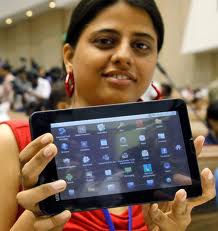New Delhi, Jan 1: The third version of low cost tablet "Aakash" will be a delight for its users as developers are likely to equip it with a SIM slot and more exciting apps, all within the existing price band.
About 50 lakh "Aakash 3" tablets are expected to be rolled out in the next phase, the global tender for which may be floated in February, 2013.
According to committee members engaged in developing the third version of Aakash, the endeavour will be to make the product as indigenous as possible and involve multiple vendors.
“Our ultimate aim is to imbibe the usage of tablets in the education system and create an ecosystem for this,” said Deepak B. Phatak, committee member and professor in IIT- Bombay"s Department of Computer Science and Engineering.
According to Mr. Phatak, computer giants world over are amazed with the device and there is a keen interest among several vendors to participate in this venture.
Aakash 3 will have a faster processor supporting both Linux and Android operating systems and come with advanced memory, he said.
“It could also have a SIM card slot so that people can use it as a communication device,” Mr. Phatak said.
Apart from Mr. Phatak, Prof Ashok Jhunjhunwala of IIT-Madras along with hundreds of students and other partners are also involved in making the new Aakash 3.
One of the aims of students involved in the project is to develop an application for the tablet that can tell pulse rate among many others.
It will also have a larger distribution and servicing system so that owners can get their tablets repaired locally.
Playing down controversies suggesting that several of the tablet"s components were of Chinese make, Mr. Phatak said emphasis has been placed on adding value to the product with the objective of enhancing its efficacy among students.
He also suggested two models for Aakash 3 — one for schools and the other for colleges.
The most recent version, Aakash 2, developed by IIT-Bombay along with C-DAC (Centre for Development of Advanced Computing), was launched by President Pranab Mukherjee in November.
The tablet is available for students at subsidised rate of Rs. 1,130 while the government purchases it at Rs. 2,263.





Comments
Add new comment